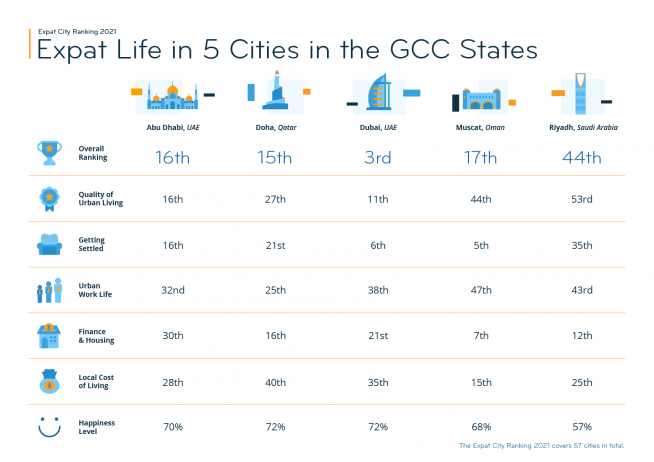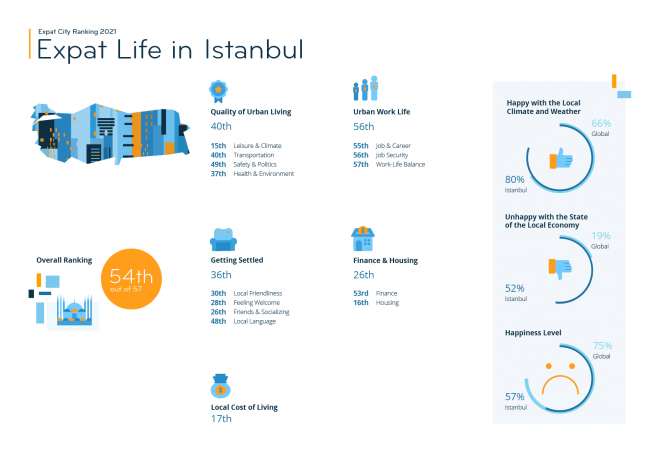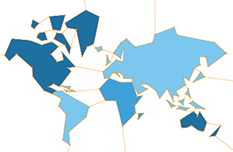Cities in the Middle East
- 3. Dubai, UAE
- 15. Doha, Qatar
- 16. Abu Dhabi, UAE
- 17. Muscat, Oman
- 44. Riyadh, Saudi Arabia
- 54. Istanbul, Turkey
3. Dubai, UAE
Dubai ranks 3rd out of 57 in the Expat City Ranking 2021, placing highest of all GCC cities included in this report. It receives its best results in the Getting Settled Index (6th), making it into the top 10 of every subcategory: Local Language (4th), Friends & Socializing (7th), Local Friendliness (7th), and Feeling Welcome (10th). Dubai is the easiest city in the world to live in without speaking the local language (94% vs. 54% globally). Moreover, 81% describe the local people as generally friendly towards foreign residents (vs. 67% globally). “They are warm, welcoming, and friendly,” says an Indian expat. Maybe this is why expats feel at home in Dubai (75% vs. 65% globally) and find it easy to make new friends (59% vs. 48% globally).
Dubai also performs very well in the Quality of Urban Living Index (11th). Expats are particularly happy with the political stability (90% vs. 64% globally), and nearly all of them (97%) feel safe (vs. 84% globally). However, Dubai falls behind in the Urban Work Life Index (38th). It even ranks among the bottom 10 for job security (51st): 32% are dissatisfied with this factor (vs. 20% globally). Expats are also unhappy with their work-life balance (22% vs. 17% globally), and fewer than two in three (65%) are satisfied with their job in general (vs. 68% globally).
Lastly, Dubai gets mixed results in the Finance & Housing Index (21st). It ranks well in the Housing Subcategory (12th): 86% say that housing is easy to find (vs. 60% globally). However, 41% find it unaffordable (vs. 39% globally), and the city does poorly in the Finance Subcategory (49th): 28% rate their financial situation negatively (vs. 19% globally), and 31% say that their disposable household income is not enough to cover expenses (vs. 23% globally).
15. Doha, Qatar
Coming 15th out of 57 in the Expat City Ranking 2021, Doha does best in the Finance & Housing Index (16th): 80% of expats say it is easy to find housing in Doha (vs. 60% globally), and 70% are happy with their financial situation (vs. 64% globally). A Russian expat mentions her “financial conditions” as a personal highlight of living in Doha. Nevertheless, 52% rate the local cost of living negatively (vs. 34% globally), with the city landing in 40th place in the Local Cost of Living Index.
The city performs above the global average in the Getting Settled Index (21st). Similar to Dubai, Doha makes it easy for expats to live there without speaking the local language (90% vs. 54% globally). Expats also find it easy to make new friends (53% vs. 48% globally) and are happy with their social life (64% vs. 57% globally). In the Urban Work Life Index (25th), Doha stands out for the state of its local economy (6th), which receives the best results out of all GCC cities featured in the survey. However, expats are dissatisfied with their job security (23% vs. 20% globally) and working hours (21% vs. 16% globally).
Lastly, Doha ranks 27th in the Quality of Urban Living Index. However, it ends up in the bottom 10 for local leisure options (52nd). Close to one in five (19%) rate this factor negatively (vs. 14% globally). On the upside, the city ranks 1st out of 57 for the availability of healthcare, with 90% rating this factor positively (vs. 76% globally). A high majority also find it affordable (83% vs. 61% globally) and are happy with its quality (91% vs. 71% worldwide). “I feel extremely safe here with a good healthcare system,” says a US American expat. In fact, 93% of expats feel safe in Doha in general (vs. 84% globally).
16. Abu Dhabi, UAE
Coming 16th out of 57 in the Expat City Ranking 2021, Abu Dhabi performs best in the Getting Settled and Quality of Urban Living Indices (16th for each). Regarding the quality of living, it stands out in the Safety & Politics (4th) and Health & Environment (9th) Subcategories. Expats rate the political stability positively (90% vs. 64% globally) and feel safe in Abu Dhabi (93% vs. 84% globally). “It is safe for my daughters and me here, and the healthcare is of high quality and efficient,” a Kenyan expat notes. In fact, expats are very satisfied with the availability (88% vs. 76% globally) and quality (90% vs. 71% globally) of medical care. In terms of getting settled, expats find it easy to live in Abu Dhabi without speaking the local language (90% vs. 54% globally) and describe the local people as generally friendly towards foreign residents (73% vs. 67% globally).
While Abu Dhabi ranks midfield in the Local Cost of Living (28th) and Finance & Housing (30th) Indices, it lands in the bottom 10 of the Finance Subcategory (51st). About three in ten expats are unhappy with their financial situation (29% vs. 19% globally) and say that their disposable household income is not enough to cover expenses (31% vs. 23% globally). While housing is also considered unaffordable (51% vs. 39% globally), 73% say that it is at least easy to find (vs. 60% globally).
The city ranks slightly worse in the Urban Work Life Index (32nd), with especially poor results for work-life balance: only 55% are happy with this factor, compared to 66% globally. While 22% also rate their job security negatively (vs. 20% globally), more than half (52%) are happy with the local career opportunities (vs. 45% globally).
17. Muscat, Oman
Muscat ranks 17th out of 57 in the Expat City Ranking 2021, receiving excellent results in the Getting Settled Index (5th). The city even ranks 1st worldwide for both the general friendliness of its local residents (88% happy vs. 69% globally) and the friendliness towards foreign residents in particular (85% vs. 67% globally). “The local people are so kind and friendly,” says an expat from India. It is hardly a surprise that 73% of expats feel at home in Muscat (vs. 65% globally), while 69% find it easy to get used to the local culture (vs. 65% globally).
Muscat’s top 10 rank in the Finance & Housing Index (7th) is mainly due to the Housing Subcategory (4th). In fact, 80% of expats have no difficulties finding housing there (vs. 60% globally), and 48% consider it affordable (vs. 42% globally). But the city performs below the global average in the Finance Subcategory (37th): only 54% are happy with their financial situation (vs. 64% globally). Another 29% say that their disposable household income is not enough to cover expenses (vs. 23% globally) — even though Muscat ranks 15th in the Local Cost of Living Index, with 53% rating this aspect positively (vs. 48% globally).
With a below-average result in the Quality of Urban Living Index (44th), Muscat is rated poorly for its public transportation system (41% unhappy vs. 20% globally) and the quality of medical care (22% vs. 14% globally). On the upside, 95% of expats feel safe in Muscat (vs. 84% globally). Lastly, the city does worst in the Urban Work Life Index (47th). Expats are particularly unhappy with their job security (33% vs. 20% globally) and local career opportunities (47% vs. 33% globally). In fact, Muscat ranks second to last worldwide for the latter, only ahead of Rome (57th).
44. Riyadh, Saudi Arabia
Placing 44th out of 57 in the Expat City Ranking 2021, Riyadh lags far behind the other cities from the GCC region that are featured in the survey. It performs especially poorly in the Quality of Urban Living Index (53rd), only ahead of Dublin, Rome, Cairo, and Johannesburg (57th), even ranking last worldwide in the Leisure & Climate Subcategory (57th): 27% rate the climate and weather negatively (vs. 17% globally), and 37% are dissatisfied with the local leisure options (vs. 14% globally). Expats are also unhappy with the public transportation system (45% vs. 20% globally) and the urban environment (33% vs. 16% globally).
Riyadh does not fare much better in the Urban Work Life Index (43rd), where it lands in the bottom 5 of the Work-Life Balance Subcategory (54th): about one in three expats are unhappy with both their work-life balance (31% vs. 17% globally) and their working hours (33% vs. 16% globally). More than one-quarter (26%) also rate their job security negatively, compared to 20% globally. While its overall performance in the Getting Settled Index (35th) is about average, Riyadh ranks 55th for expats’ satisfaction with their social life. Close to two in five (39%) rate this negatively — only in Dusseldorf and Stockholm are expats less satisfied. What is more, 30% do not feel at home in Riyadh (vs. 19% globally).
While Riyadh does alright in the Local Cost of Living Index (25th), it performs best in the Finance & Housing Index (12th). More than seven in ten expats (72%) have no difficulty finding housing in Riyadh (vs. 60% globally), and 38% find it affordable, which is just below the global average (42%).
54. Istanbul, Turkey
Istanbul (54th out of 57) lands in the bottom 10 of the Expat City Ranking 2021. It even comes in second to last in the Urban Work Life Index (56th), where only Rome performs worse. Istanbul ranks among the bottom 10 of every factor in this index, even placing last worldwide for the state of the local economy (52% unhappy vs. 19% globally), working hours (33% vs. 16% globally), and work-life balance (33% vs. 17% globally). What is more, expats are unhappy with their job security (38% vs. 20% globally) and local career opportunities (44% vs. 33% globally).
Istanbul performs somewhat better in the Quality of Urban Living Index (40th), despite particularly poor results for political stability (52nd) and the urban environment (50th). Three in ten expats (30%) rate the latter negatively, compared to 16% globally. When it comes to the Getting Settled Index (36th), 51% find it hard to live in Istanbul without speaking the local language (vs. 29% globally). An Italian expat explains that “if you do not speak the Turkish language, it is difficult to navigate life here”, while a Spanish expat says that “the language is very difficult, and no one speaks English”.
On the bright side, Istanbul has an above-average performance in the Local Cost of Living Index (17th). “The cost of living is low,” says a British expat. “Good-quality food does not cost much.” However, this is not reflected in the Finance Subcategory (53rd), which is part of the Finance & Housing Index (26th). More than three in ten each are dissatisfied with their financial situation (32% vs. 19% globally) and feel that their disposable household income is not enough to cover expenses (31% vs. 23% globally). However, housing is considered affordable (50% vs. 42% globally).





